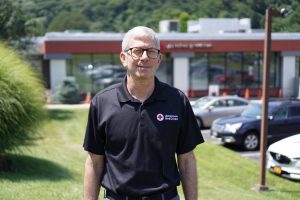Steps to Take to Address Your Mental Health During a Pandemic

Alec Cecil has counseled a vast number of individuals and families traumatized by disasters, from fires to hurricanes to mass shootings.
But even for Cecil, a psychologist who has spent most of his career at the Albert Einstein College of Medicine and Montefiore Medical Center, helping others wracked by the very real anxieties and fears produced by the coronavirus pandemic is among the most challenging.
Cecil has been a lead mental health volunteer for the Red Cross and is being called upon to work with people using his expertise to ease people through this national health emergency. COVID-19 is unlike any other disaster he has had to deal with previously.
“This is certainly far different in that it affects everybody, and so everybody is going to feel stress and anxiety and obviously it’s a long-term situation,” said Cecil, who was among the mental health professionals called in after Hurricane Harvey and the Las Vegas and Parkland shootings.
“I don’t think any of us have been through something like this, really. Most disasters, it may be very bad and they have an effect on the community, but there are many people that are not so directly affected. In this case, everybody is. It’s not time-limited.”
There are so many levels to the COVID-19 crisis. There are likely to be hundreds of thousands of families affected in some way with their own health issues or that of a relative or even a death.
But even if someone is fortunate to sidestep that tragic misfortune, they or their spouse may have lost their job or struggling to keep a business afloat and questioning what the future holds, Cecil said.
Then there’s the uneasiness of not knowing when normalcy will return or even if you have the disease, and not being able to be with friends or family, especially as this week’s holidays approach. It makes so many feel helpless, said Cecil, a Pelham Manor resident.
“People are afraid that their presence can harm others and you know that’s a very difficult thing to deal with,” he said. “To see yourself as the vector, or a potential vector, of a contagion. That’s actually more of a concern for people than actually getting sick themselves, especially if they’re younger and healthy and not in a higher risk category.”
Those with pre-existing mental health issues could be particularly vulnerable, Cecil said.
Despite the painful news and frightening outlook, there are steps that Cecil suggests for people to follow to keep their own mental and physical health strong. Understand that while there are many factors that are beyond any one of our control, focus on things that you can influence, he advised.
Even if you’re stuck at home, make a daily routine. Stay physically strong by exercising to the extent that you can, including taking walks while keeping at least six feet of distance, and get enough sleep. It’s okay to indulge a little in comfort foods, but make sure to eat healthfully and stay hydrated, Cecil said. However, he advised to stay away from drinking too much alcohol.
It’s important to keep up with the news but if it’s causing anxiety find other things to do. He suggested watching movies, play video games, listen to music and spend more time with family.
For some people, meditation or yoga may also be helpful, Cecil added. Getting in the right frame of mind can allow you to be grateful for what you have, even if you may not be able to do a lot of what you would like.
Cecil said keep in perspective that at some point this crisis will end and that the worst is not likely to happen to many of us.
“It may, but we try to look at what’s more or less likely, and also to recognize that most people are quite resilient,” Cecil said. “You have coping strategies you can use.”
For those who need assistance, he suggests reaching out to support groups through apps and online meetings or contacting organizations such as the American Psychological Association or the American Psychiatric Association.
New York residents can also contact the state Emotional Support hotline at 1-844-863-9314. State residents can also receive a free app at www.headspace.com/ny.

Martin has more than 30 years experience covering local news in Westchester and Putnam counties, including a frequent focus on zoning and planning issues. He has been editor-in-chief of The Examiner since its inception in 2007. Read more from Martin’s editor-author bio here. Read Martin’s archived work here: https://www.theexaminernews.com/author/martin-wilbur2007/

